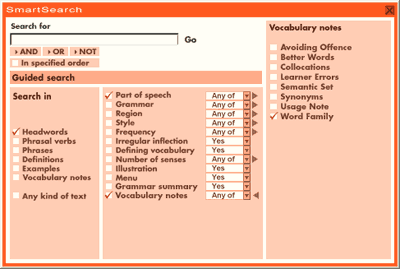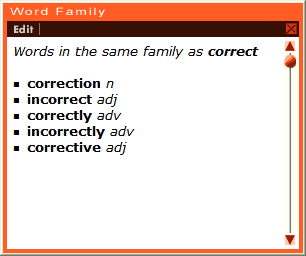|

FROM THE EDITOR
 In
this Issue In
this Issue
 Contributors Contributors
 Letters
to the Editor Letters
to the Editor
 Write
to Us Write
to Us
 Spread
the Word Spread
the Word
 Back
Issues Back
Issues
 Index Index

FEATURE
 Getting
around in American Getting
around in American
and British English
 Birthday
Greetings Birthday
Greetings
MED Magazine celebrates
its first birthday
COLUMNS
 Metaphor Metaphor

What we talk about
when we talk about
money
 Focus
on Language Focus
on Language
Study:
Introduction
Text types
Narratives and descriptions
UK
version ¦ US
version
 New
word of the month New
word of the month
Festive food and drink
alternatives
 Top
Tips for the CD-ROMs Top
Tips for the CD-ROMs
Vocabulary building with
word families
 onestopenglish.com onestopenglish.com
|
 |
Top
Tips for the CD-ROMs
by Mairi
MacDonald
As the Language Study article
on writing and text types points out, students need a wide range of vocabulary,
particularly adjectives for describing people and places. To help students
expand their vocabulary, The Macmillan Essential Dictionary has
vocabulary notes containing information on word families. This month we
look at how these notes can be used to create activities that broaden
your students' vocabulary as well as practice what they have learned.
Finding Word families in
the Macmillan Essential Dictionary
Using SmartSearch, select the following options:
Headwords
Part of speech > adjectives
Vocabulary notes: Word Family

This will give you 8 adjectives containing extra information
on word families. The word family can be accessed by clicking on the box
on the right. Here is the Word Family box for correct.

|
Tip
Create a wordlist
by selecting Edit and Add to wordlist to the right
of the Search Results panel.
You can then run
activities from this wordlist as a revision exercise.
|
You can copy the information in the Word Family boxes
by selecting Edit and Copy. If you copy and paste the example
sentences for each member of the word family, you can use this to create
worksheets for your class.
|
Word Families
|
|
Discuss word families, e.g. what words belong
to the same word family. |
|
|
Think of as many words as you know that belong
to the word family of the words in the box below. Check your
answers in the dictionary.
|
able
|
active
|
clear
|
correct
|
|
honest
|
national
|
necessary
|
pure
|
|
|
|
Complete the sentences with the correct form
of the word in brackets.
Examples:
able I'd love to be able to sing like you.
(able)
disability The project is aimed at children with
learning disabilities. (able)
| I want you to give me an ______ answer.
(honest) |
| This will ______ users to conduct
live video conversations. (able) |
| His contract ______ states that he
cannot leave before next year. (clear) |
| ______ aid organizations are appealing
for donations from western governments. (nation) |
| I read the report and made a few small
______. (correct) |
| On Saturdays, there's always lots
of ______ in the streets. (active) |
| She was trying to do her job ______
and fairly. (honest) |
| Tiredness can affect your ______ to
drive. (able) |
| We want government to serve the whole
______. (nation) |
| The policy had caused thousands of
families ______ suffering. (necessary) |
| The first person to give the ______
answer wins the contest. (correct) |
| Rose is still ______ at the age of
87. (active) |
| There may be as many as 20 different
______ in a school. (nation) |
| I don't want to be disturbed unless
it's absolutely ______. (necessary) |
| Some of the children were ______ to
read. (able) |
| She guessed my age ______. (correct) |
| She is a woman of ______ and integrity.
(honest) |
| Our customers will not ______ understand
why we are raising our prices. (necessary) |
| What I'm saying is ______ my own point
of view. (pure) |
See
the answers |
|
As a follow up, create a wordlist containing all the words
that feature in the list of answers. You can use this wordlist as a basis
for activities such as Scrambled Words or Definitions. For
more information on creating wordlists and using the Activities feature
in the Macmillan Essential Dictionary, see the Top Tips column
in Issue 12.
|





